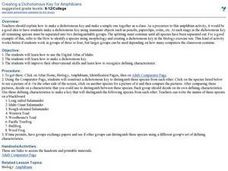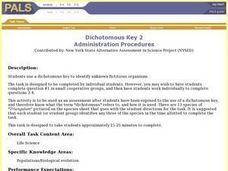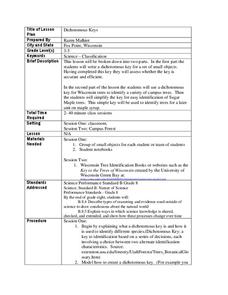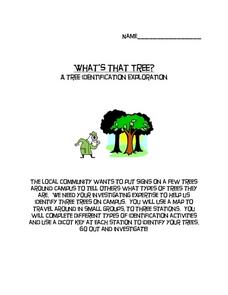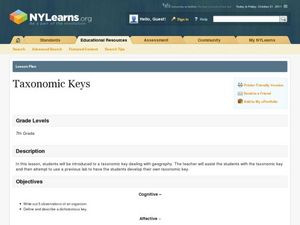Captain Planet Foundation
Which Plant Is Which?
Learn about dichotomous keys, plant identification, and how to care for the planet with a lesson plan that includes several hands-on and innovative activities. Kids go on a plant scavenger hunt and classify the plants that they find...
Curated OER
Creating a Dichotomous Key for Amphibians
Students are introduced to the purpose of dichotomous keys and create one together as a class. In groups, they use a digital atlas to examine the different types of amphibians in Idaho. Using this information, they make their own...
Curated OER
Introducing the Use of Dichotomous Keys to Students
Young scholars are introduced to the use of dichotomous keys as a simple means of beginning scientific observations in nature. They comprehend how to use a dichotomous key. Students distinguish characteristics of a group of organisms....
Curated OER
Dichotomous Key 2
Students use a dichotomous key to identify unknown fictitious organisms in an assessment designed to be used after a discussion on the use of a dichotomous keys has occurred. Follow up questions about key included.
Curated OER
Creating a Dichotomous Key for Families of Idaho Butterflies
Students are shown how to use the butterfly section of the Digital Altals of Idaho. They discuss how to make a dichotomous key. Students use their skills of observation and recognize defining characteristics that distinguish different...
Curated OER
Dichotomous Keys
Students utilize dichotomous keys to identify trees in their schools. In this ecological identification lesson, students practice creating dichotomous keys based on simple subjects such as hair color or sex of a person....
ARKive
Species Discovery
How do you classify a newly discovered species? Learners view a presentation and complete research about biodiversity and the classification hierarchy. The lesson includes activities with dichotomous keys and work on classifying both...
Curated OER
The Sky and the Dichotomous Key
Pupils use a dichotomous key to distinguish between different types of clouds
Curated OER
Building a Dichotomous Key
Young scholars analyze how a dichotomous key helps us explain and identify unknown organisms. They design and construct a dichotomous key, developing a list of three observable characteristics per organism.
Curated OER
Dichotomous Key for Identifying Pine Trees
Students identify the species of pine trees that are found in their area. They use unlabeled "mystery" samples and a dichotomous key to identify the pine trees to species. After identification, they use a field guide to answer worksheet...
Curated OER
Dichotomous Keys
Students classify objects and organisms using a dichotomous key. They are shown a demo by the teacher and then practice on their own. They discover why classification is important.
Curated OER
Dichotomous Key
Eighth graders use a dichotomous key to identify unknown fictitious organisms. They work individually during this exercise. The task is designed to take students approximately 15-25 minutes to complete.
Science 4 Inquiry
The Classification of Living Things
It's a classification sensation! Demystify why we classify using an inquiry activity that helps your class sort things out. Groups begin by classifying a variety of shoes before they research organisms and design their own dichotomous...
Curated OER
What's That Tree?
Fifth graders identify trees along a nature trail. Using a dichotomous key, 5th graders answer questions to aid in their identification of trees along a specified nature trail. Observations are recorded in their science journals. Sample...
Curated OER
Regents High School Examination: Living Environment 2010
This exam touches upon every topic within the typical first year biology course.. A broad variety of question styles give high schoolers every opportunity to show what they know. Why start from scratch when a comprehensive final exam is...
Curated OER
The Sky and the Dichotomous Key
Students conduct observations and use a dichotomous key to identify clouds they see.
Michigan State University
Bug Lyphe!
Introduce ecology classes to biodiversity and interdependence in ecosystems with a PowerPoint presentation. Then, they get up-close and personal with the invertebrate world by collecting insects, classifying them, and graphing their...
Chicago Botanic Garden
Impacts of Climate on Forest Succession
Part two in a series of four explores the effects of climate on succession or the changing of plant species in a forest. Groups review how to identify trees and then spend a day in the field collecting extensive data on trees to...
Curated OER
Seeds and Trees Lesson Plan
Students investigate various tree leaves and use a dichotomous key to classify the leaves. In this leaf classification lesson plan, students study various types of leaves and their Genus. Students record observations for each Genus.
Curated OER
Reptile Identification Exercise
Learners are shown how to use the Digital Atlas of Idaho. They use a dichotomous key to identify species of Idaho reptiles. Students describe some basic life characteristics of reptiles. They use th visual key to identify the species...
Curated OER
The Food Pyramid
Fourth graders plan a variety of nutritional meals using the USDA's Food Guide Pyramid as a reference and analyze food labels to plan their meals. They examine and discuss the Food Pyramid, and create dichotomous keys separating food...
Curated OER
Everybody Needs a Rock
Students, after making quantitative and qualitative observations of their rocks, construct a Venn diagram or dichotomous key to classify their rocks.
Curated OER
Taxonomic Keys
Seventh graders create their own dichotomous key. In this biology lesson, 7th graders classify animals based on their observable features. They explain how to use their dichotomous key.
Cornell University
Classification
Explore the scientific method of classification. An interactive activity asks learners to create a classification system for a group of objects and develop a flow chart to communicate their systems. In addition, individuals use a...

